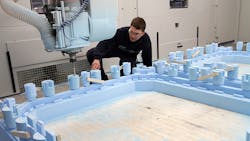Britain’s AMRC Castings, part of the Advanced Manufacturing Research Centre with Boeing at the University of Sheffield, has installed a customized, large dimension five-axis CNC machine to be used in cutting polystyrene for casting molds. The operation recently completed a new steel foundry operation, able to cast parts weighing up to 1,300 kg (1.43 tons.)
The CMS Industries five-axis Poseidon machine was purchased with contributions from Innovate UK, a government agency that provides research and development funding to business and industry; and from the Aerospace Technology Institute, as part of an initiative to develop British resources for producing aerospace castings weighing up to 500 kg in titanium, 300 kg in super-alloys, and nearly 3,000 kg in steel.
The Poseidon is described as being specifically designed for high-speed machining of large aluminum and light alloy pieces, composite materials, impregnated fibers, and sand- or wood-based materials. It has a 2,600x2,500-mm worktable, with an available Z axis of 1,300, 2,000, or 2,500 mm. The maximum axis speed is 85 m/min.
The value of the AMRC Castings installation was not announced.
In 2013, the Advanced Manufacturing Research Centre purchased Castings Technology International and its affiliate Titanium Castings UK Ltd., a research organization with members that include metalcasters, casting industry suppliers, and casting customers, with capabilities in casting design, material development and selection, manufacturing technologies, quality control, and testing and performance. Both CTI and AMRC are located in a research campus in Rotherham, which allowed AMRC to add casting technology to the range of its industrial research portfolio.
While the broader project is ongoing, AMRC reported the new CNC system is already producing patterns for casting prototype framework for nuclear waste storage vessels. The project involves a plant for nuclear fuel reprocessing and nuclear decommissioning at Sellafeld, in northwest England. The project is being conducted as part of the Civil Nuclear Sharing Growth Programme, which is intended to advance the U.K.’s civil nuclear manufacturing supply chain and help private firms engage in nuclear-energy programs, domestically and internationally.
The 1.6-m. square frames are fabricated from 30 separate pieces of duplex stainless steel sheet and bar. With the availability of the CMS Poseidon machine, AMRC Castings can now produce individual patterns up to a maximum 2.6x4.0x2.0 metes, “well above the size of the frames,” according to an announcement.
The castings are produced using AMRC’s Replicast® and MEGAshell® technologies ceramic molding processes stainless steel parts, producing unitary frame structures with superior surface-finish qualities. A number of the frames are being made by AMRC Castings to demonstrate the repeatability of the production process.
“We believe we can reduce the cost of the box by a sixth and, given the number of boxes required, that could result in savings of up to £150 million,” stated AMRC Castings’ Richard Gould. “Using a near-net shape casting optimizes metal use, saves a massive amount of work and significantly reduces the task of inspecting the finished product to make sure it meets stringent nuclear standards.”
About the Author
Robert Brooks
Content Director
Robert Brooks has been a business-to-business reporter, writer, editor, and columnist for more than 20 years, specializing in the primary metal and basic manufacturing industries. His work has covered a wide range of topics, including process technology, resource development, material selection, product design, workforce development, and industrial market strategies, among others.
